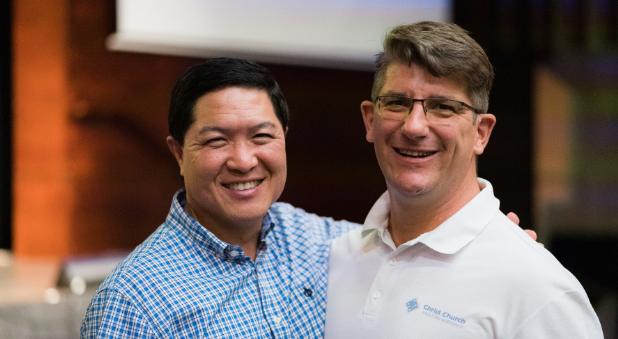The Rev Denis Oliver, rector of Christ Church, Mortdale
I was born in Montevideo, Uruguay. When we moved to Australia we hung out with our Uruguayan enclave. The weekend was filled with Uruguayan barbecues – six-hour events where it all revolves around meals and talking. Sometimes I felt like a half breed, because I can understand the Spanish but I’m not fluent. I didn’t fit in with the Aussies because anglos are less affectionate. I felt somewhere in the middle.
Studying theology
I noticed cultural differences when I studied theology. No one ever treated me badly, the guys at Moore were lovely but anglos don’t touch, they have a larger talking distance, they’re more emotionally reserved, passion is confused with anger in conversation, and it’s usually about rugby, cricket and boat shoes. There’s nothing wrong with those things, but when you’re not into it and that’s the culture it can be hard.
"When our cultures meet, we form a new Christian culture"
Hospitality is important. The church is my home, and my home is open. I’m in the car park every Sunday welcoming people by name. You’ve got to welcome people, feed them lots and send them home with the leftovers. In hospitality, you want to err on the side of more.
I think foreigners will readily open their doors but Anglos won’t, and that can affect integration at church. The classic line is “We’re a friendly church”. Everyone is friendly on Sunday, but there’s no integration that moves people into a belonging situation. I’m surprised when people thank me for opening my home to our Bible study, because I don’t think it’s a big deal, it’s a normal thing to do.
How to build a bridge
To build a bridge between any two cultures, you’ve got to build at both ends at the same time. You’ve got to exegete your own culture as well as the culture of the other person you’re trying to serve. In getting to know a person, you’ve just got to be sensitive to that person. If anyone has to change their culture, the person in leadership has to be flexible. To meet people where they’re at, you have to know where that is and where you are. Paul says it in Corinthians: he knows who he is and so to Greeks he was Greek and to Jews he was Jewish.
"We are all missionaries"
When our cultures meet, we form a new Christian culture, and then when someone new comes along we start the process again. So for me, my background is loud and passionate, and on a personal level I’ll always pull back because I want to adjust my culture to understand how best to talk to your culture.
We are all missionaries, and the key to being a missionary is understanding the culture you’re going to and the culture you’re coming from. Our responsibility is bringing the gospel into that.























